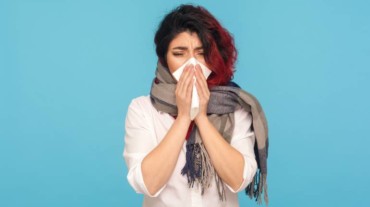
Against the current backdrop of Covid-19 cases, the country must also now gear up to avoid a ‘twindemic’ – simultaneous outbreaks of influenza and Covid-19.
Influenza (or ‘the flu’) is an acute respiratory viral infection, easily transmitted from person to person. While last year, a combination of lockdowns, mask-wearing, social distancing, and lack of diagnosis (owing to lesser doctor consultations) lessened the perceived impact of the flu season, the current seasonal variation across the country poses a potential threat to public health.

The symptoms of influenza and Covid-19 are very similar. These ‘twins’ share the following signs – fever, cough or sore throat, difficulty breathing, fatigue, muscle or body aches, headache, and runny or stuffy nose. This makes it hard to tell the difference between them. Sometimes, even co-infections can occur in individuals.
Influenza-A is the most common co-infecting virus, observed in 64 percent of Covid-19 co-infection cases. This can be a serious threat associated with high severity and case fatality. Research suggests that co-infection has been prevalent since the onset of the pandemic, with the highest burden witnessed in Asia.
Influenza affects all age groups. However, the focus of preventive efforts is largely on children, with a long way still to go with regards to the adult population, including those with suppressed immunity who need annual flu shots.
Poor influenza vaccination uptake has been observed among people living with diabetes, despite it being vital for them to avoid influenza-related complications. This is worrying, as research suggests that mortality rates can increase by 5 to 15 percent among people with diabetes during flu epidemics, and India is the diabetic capital of the world, home to more than 74 million people with diabetes.
Influenza, thus, further exacerbates existing underlying comorbidities, resulting in greater disease burden. Vaccination, particularly for adults with underlying health conditions, is a critical and highly effective strategy to prevent such infections and has proven to reduce influenza or pneumonia related hospitalizations for diabetics by 80 percent.
Also Read: Cold, flu or Covid-19? Here’s what to do if you’re at crossroads

With the risk of co-infection with influenza at 57 percent, getting a flu shot this year is highly recommended. It can prevent 70 to 90 percent of influenza-related complications. Annual flu shots are in accordance with World Health Organisation (WHO) recommendations, based on continuous global surveillance updates, adapting to the variant spreading in the current flu season. People are advised to get a flu shot two weeks prior to their region’s flu season, with the exact schedule potentially discussed with one’s medical provider.
Getting a Covid-19 vaccine won’t protect against the flu and vice versa. Flu vaccines and Covid-19 vaccines, which can be given at the same time, also do not impact the effectiveness of the other, contrary to misconceptions.
Select Topics of your interest and let us customize your feed.
PERSONALISE NOWIncreased emphasis on vaccination for at-risk adults ensures greater, layered protection to people’s families, friends and society at large. This will also become important as people begin to step out, returning to work and daily activities, and revive the economy. Considerable improvements in adult vaccination coverage are necessary.
A multi-pronged nationwide immunization plan can significantly reduce the strain on healthcare systems. Prevention is better than cure, which is the key to staying healthy and avoiding influenza and other complications this season.
Get Latest Updates on Preventive Care, Family Care, Reproductive Care, Self Care